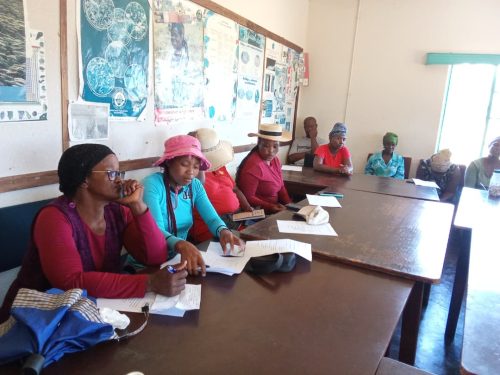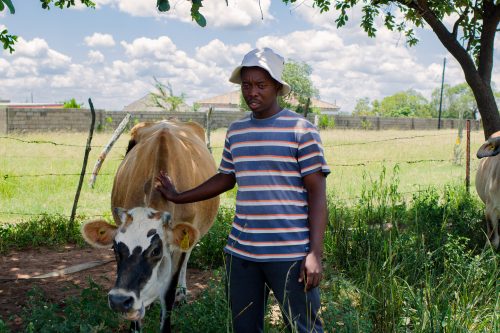BY PHESHEYA KUNENE – EDITOR
EZULWINI – Eswatini is intensifying its fight against antimicrobial resistance (AMR), positioning sustainable livestock management and biosecure farming at the forefront of national agricultural strategy.
On 21 November 2025, policymakers, government officials, and international partners convened at Happy Valley Hotel for a high-level meeting during World Antimicrobial Resistance Awareness Week (WAAW) 2025.
At the heart of discussions was the urgent need for farmers to adopt responsible antimicrobial use, enhanced farm hygiene, and strategic vaccination to reduce dependency on antibiotics.
Minister of Agriculture Mandla Tshawuka emphasized that these measures are essential not only for protecting animal health but also for boosting farm productivity, securing food systems, and expanding economic opportunities across the agricultural sector.
The One-Health Approach: Connecting Health, Environment, and Agriculture
Represented by Under-Secretary Sicelo Nxumalo, His Royal Highness Prince Lonkhokhela underscored the importance of a One-Health Approach, which integrates human, animal, and environmental health strategies. Misuse of antibiotics in livestock and humans, along with improper disposal of medical and agricultural waste, creates reservoirs of resistant microbes. These pathogens infiltrate water, soil, and food chains, threatening ecosystems, livestock productivity, and livelihoods.
Nxumalo highlighted that cross-sector collaboration is critical: “Environmental stewardship, sustainable land use, water management, and pollution control are pivotal to interrupting AMR pathways,” he said, urging policymakers, technical experts, and farmers alike to translate strategy into concrete actions.
Data-Driven Policies and the Fleming Fund Legacy
Eswatini’s strengthened AMR surveillance system, supported by the Fleming Fund, has provided critical evidence linking antimicrobial use to resistance patterns and environmental impact. Laboratories at the Central Veterinary Lab, Malkerns Research Lab, and Food Hygiene Lab have been upgraded, while personnel have been trained in modern diagnostic and monitoring techniques. ICAP and other partners have provided technical support to ensure the system produces reliable, actionable data.
With Fleming Fund support ending in December 2025, stakeholders were urged to embed these achievements into national agricultural and development plans, ensuring the continuity of evidence-based interventions and surveillance systems.
Impact on Agriculture and Livelihoods
AMR directly threatens the Ministry of Agriculture’s mission to transform Eswatini’s agriculture into a sustainable, diversified, and commercially viable sector. Overuse of antibiotics for growth promotion in livestock not only reduces the efficacy of life-saving drugs but also increases animal suffering, reduces yields, and undermines food security. Minister Tshawuka highlighted vaccines as a practical alternative, reducing infections and limiting the need for antibiotics in livestock.
Principal Secretaries from the Ministries of Health and Agriculture emphasized that responsible farming practices, including biosecurity measures, proper disposal of expired medicines, and hygienic production systems, are essential to curb resistance. They also noted that failure to act could compromise national goals such as doubling agricultural productivity by 2030, as envisioned in Sustainable Development Goal 2.
Opportunities for Farmers and Investors
The fight against AMR is not just a challenge—it is a call to innovation and investment. Farmers who adopt modern hygiene protocols, biosecure production systems, and responsible antimicrobial practices can improve herd health, increase yields, and access disease-free export markets. For investors, supporting these interventions represents a pathway to profitable, sustainable, and future-ready agricultural ventures.
Commitment to a Resilient Future
Principal Secretaries from the Ministries of Health and Agriculture emphasized that responsible farming practices, including biosecurity measures, proper disposal of expired medicines, and hygienic production systems, are essential to curb resistance. They also noted that failure to act could compromise national goals such as doubling agricultural productivity by 2030, as envisioned in Sustainable Development Goal 2.
Opportunities for Farmers and Investors
The fight against AMR is not just a challenge—it is a call to innovation and investment. Farmers who adopt modern hygiene protocols, biosecure production systems, and responsible antimicrobial practices can improve herd health, increase yields, and access disease-free export markets. For investors, supporting these interventions represents a pathway to profitable, sustainable, and future-ready agricultural ventures.
Commitment to a Resilient Future
The high-level meeting underscored Eswatini’s commitment to AMR containment through multisectoral collaboration. The government continues to monitor all imported antibiotics, recategorize restricted substances, and enforce regulations that promote prudent use in livestock. The Minister of Natural Resources and Energy reinforced the need to integrate environmental considerations into all AMR strategies, ensuring that interventions in agriculture and health do not inadvertently harm ecosystems.
As the event concluded, the message was clear: Eswatini’s agriculture sector stands at a decisive juncture. By acting decisively today, farmers can safeguard their herds, protect livelihoods, and shape agriculture into a resilient, productive, and economically transformative enterprise. The country’s collective resolve signals a bold step toward a future where public health, livestock productivity, and environmental sustainability advance hand in hand.












